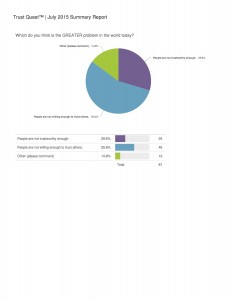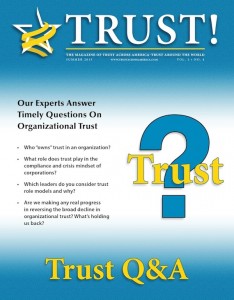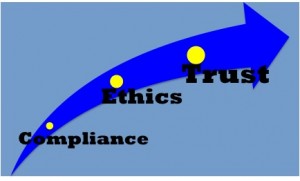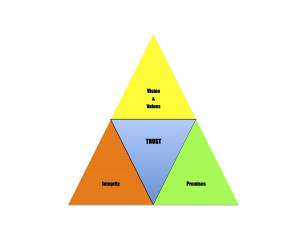How do low-trust leaders communicate when faced with a trust breach? Here’s a quick sampling of 10 “one- liners” pulled from the headlines over the past several weeks.
- “It was our legal right to do so.”
- “I had no hard evidence.”
- “Errors are inadvertent and happen.”
- “We will increase our compliance monitoring.”
- “There was no calculation to mislead people.”
- “We’re all a bit stunned by the news.“
- “I mean it when I say we screwed up.”
- “No comment at this time.”
- “We continue to cooperate with the relevant authorities on pursuing those responsible for this criminal act.”
- “I was totally unaware that this was in the works.”
Huh, what and are you kidding?
Why do we continue to read these rehashed headlines after a trust violation and why do leaders use these excuses? Very simply because organizational trust is not regulated; it’s voluntary. And because of this one simple fact, trust is largely ignored in most organizations. It’s not practiced proactively unless leadership places trust high on it’s business agenda. That’s called intentional trust, and it’s very rare. Instead, most leaders wait for the next crisis (which is a “given” in low trust organizations) and then pull an excuse from the list above, usually with the assistance of the legal department.
If ANY leader of ANY organization actually believes that these “one-liners” build long-term trust with stakeholders, please drop a note to barbara@trustacrossamerica.com . I have a bridge I’d like to sell you.
Barbara Brooks Kimmel has been the Executive Director of Trust Across America-Trust Around the World since 2008. The program’s mission is simply to provide tools and assistance to organizations interested in building trust. Barbara runs the world’s largest organizational trust membership program. She is also the editor of the award winning TRUST INC. book series and the Executive Editor of TRUST! Magazine. In 2012 Barbara was named “One of 25 Women Changing the World” by Good Business International.
Barbara is an award-winning communications executive and former consultant to McKinsey who has run her own firm, Next Decade, Inc., that has been unraveling and simplifying complex subjects for over twenty years. She holds a BA in International Affairs from Lafayette College and an MBA from Baruch (City University of NY).






Recent Comments